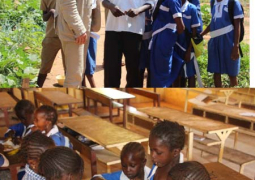The Department of Forestry, under the auspices of the Regional Project on Sustainable Management of Endemic Ruminant Livestock in West Africa (PROGEBE), on Friday concluded a four-day training for community farmers on fire management, at Jenoi in LRR.
The twenty-one farmers, seven from a district, that took part in the workshop, were drawn from Nianija, Niamina East and Kiang West districts.
Speaking at the training, the National Expert of Natural Resources Management of the PROGEBE project, Mamadou L. Ceesay, said the training formed part of the project capacity building component for community farmers.
The project also aims to empower the communities to take ownership of the community forest management and ensure sustainable use of forest resources.
“The aim of this training was to build the capacity of the farmers in marketing of their forest products, so as to improve their livelihood,” Mr Ceesay said, adding that the training entails discussion on planning of activities such as bush fire management, planting of trees and clearing of fire belt to prevent.
The sub-regional project, he says, includes Guinea Conakry, Mali,
Speaking at the training, the focal person at PROGEBE Project, for the Forestry department, Sarjoh GNH Fatajoh, says the increasing demand for fuel wood and forest products, coupled with climatic changes, has led to a decline in the forest cover ecosystem and significant biodiversity loss.
“Opportunities exist for a rational, sustainable and profitable exploitation of the livestock and resources in The Gambia,” he said.
The training covered subjects that would improve the farmers’ knowledge, skills and understanding of various forest management concepts and techniques to visualise the physical examples of application of the techniques of forest cover ecosystem, he said.
Mr Fatajoh commended the project management through the coordinator for funding the training.
For his part, Matar Badjan, Regional Forestry Officer, LRR, said the training was also held to reactivate the field implementation activities to refresh their minds on the concepts as well as to enhance the sustainable management of the forest resources in their respective areas. The training was also aimed at building knowledge base that would enable the participants to discover new skills and function effectively to support forest management through secure land tenure agreements.
Mr Badjan also thanked the PROGEBE and the focal person for their efforts and cooperation in ensuring the training was realised.



